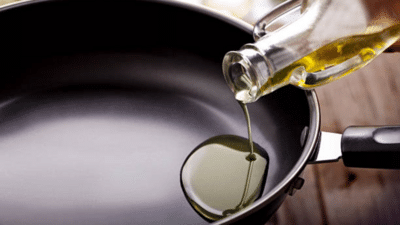There’s no denying that fats are an important part of our day-to-day diet as they provide energy and help in better nutrient absorption. However, when it comes to Indian cuisine it is difficult to strike out all forms of fats as Indian cuisine is known for its rich and flavourful delicacies that are loaded with fats. Thus, managing fats in an Indian meal may seem like a tough challenge. Well, here are some smart ways to reduce fat intake in day-to-day meals by replacing them with healthier alternatives. So, read on and try out…
Why are fats not so good?
Fats are an essential part of a balanced diet, providing energy and assisting in nutrient absorption. However, the type and amount of fat consumed play a crucial role in overall health. Excess intake of saturated and trans fats is linked to heart disease, obesity, and inflammation. Fortunately, replacing unhealthy fats with healthier alternatives can improve heart health, support weight management, and promote longevity. Here are seven practical ways to reduce and substitute fats in your diet with wholesome, nourishing options.

Healthy Cooking Oils
Replace saturated fats like butter, ghee, and palm oil with oils high in unsaturated fats, such as olive, canola, sunflower, and safflower oils. These oils have less saturated fat and provide heart-healthy monounsaturated and polyunsaturated fats, which support cardiovascular health. Using liquid oils over solid fats can reduce LDL cholesterol and inflammation.
Use Cooking Techniques
Adopt cooking methods such as steaming, boiling, grilling, and baking instead of frying or deep-frying. Using non-stick pans or sprays allows less oil usage, and cooking with broth, lemon juice, or vinegar enhances flavor without added fats. These techniques reduce total fat intake and maintain nutrient content in foods.

Replace Butter and Cream
Swap out butter, heavy cream, and sour cream in recipes with low-fat yogurt, cottage cheese, or mashed avocado for creamy texture and moisture. These replacements lower saturated fat while adding protein, probiotics, and fiber. For baking, pureed fruits like applesauce can replace fats, reducing calories and adding natural sweetness.
Plant-Based Proteins
Opt for lean meats like chicken breast or turkey without skin instead of fatty cuts of beef or pork. Incorporate plant-based proteins such as lentils, beans, tofu, and chickpeas, which contain healthy fats, fiber, and antioxidants. These choices lower saturated fat intake and promote digestive health.
Fried Foods
Avoid processed snacks and fast foods that are often high in trans fats and unhealthy saturated fats. Prepare homemade versions using whole-food ingredients and healthier fats. Reducing packaged and fried foods decreases overall harmful fat consumption and improves metabolic health.

Use Nuts, Seeds, and Avocado
Include nuts, seeds, and avocado in meals for beneficial omega-3 and omega-6 fatty acids. These foods offer anti-inflammatory properties, support brain and heart health, and provide satiety. Snacking on a handful of nuts or adding avocado to salads can replace unhealthy fats from processed sources.
Make Smarter Dairy Choices
Choose low-fat or fat-free milk, yogurt, and cheese instead of full-fat dairy products. These options reduce saturated fat while retaining calcium and protein. Gradually transitioning to lower-fat dairy helps manage cholesterol and body weight without sacrificing taste or nutrition.
Why are fats not so good?
Fats are an essential part of a balanced diet, providing energy and assisting in nutrient absorption. However, the type and amount of fat consumed play a crucial role in overall health. Excess intake of saturated and trans fats is linked to heart disease, obesity, and inflammation. Fortunately, replacing unhealthy fats with healthier alternatives can improve heart health, support weight management, and promote longevity. Here are seven practical ways to reduce and substitute fats in your diet with wholesome, nourishing options.
Healthy Cooking Oils
Replace saturated fats like butter, ghee, and palm oil with oils high in unsaturated fats, such as olive, canola, sunflower, and safflower oils. These oils have less saturated fat and provide heart-healthy monounsaturated and polyunsaturated fats, which support cardiovascular health. Using liquid oils over solid fats can reduce LDL cholesterol and inflammation.
Use Cooking Techniques
Adopt cooking methods such as steaming, boiling, grilling, and baking instead of frying or deep-frying. Using non-stick pans or sprays allows less oil usage, and cooking with broth, lemon juice, or vinegar enhances flavor without added fats. These techniques reduce total fat intake and maintain nutrient content in foods.
Replace Butter and Cream
Swap out butter, heavy cream, and sour cream in recipes with low-fat yogurt, cottage cheese, or mashed avocado for creamy texture and moisture. These replacements lower saturated fat while adding protein, probiotics, and fiber. For baking, pureed fruits like applesauce can replace fats, reducing calories and adding natural sweetness.
Plant-Based Proteins
Opt for lean meats like chicken breast or turkey without skin instead of fatty cuts of beef or pork. Incorporate plant-based proteins such as lentils, beans, tofu, and chickpeas, which contain healthy fats, fiber, and antioxidants. These choices lower saturated fat intake and promote digestive health.
Fried Foods
Avoid processed snacks and fast foods that are often high in trans fats and unhealthy saturated fats. Prepare homemade versions using whole-food ingredients and healthier fats. Reducing packaged and fried foods decreases overall harmful fat consumption and improves metabolic health.
Use Nuts, Seeds, and Avocado
Include nuts, seeds, and avocado in meals for beneficial omega-3 and omega-6 fatty acids. These foods offer anti-inflammatory properties, support brain and heart health, and provide satiety. Snacking on a handful of nuts or adding avocado to salads can replace unhealthy fats from processed sources.
Make Smarter Dairy Choices
Choose low-fat or fat-free milk, yogurt, and cheese instead of full-fat dairy products. These options reduce saturated fat while retaining calcium and protein. Gradually transitioning to lower-fat dairy helps manage cholesterol and body weight without sacrificing taste or nutrition.
You may also like

Expert names 7 plants that thrive in wet UK weather

"Centre's responsibilty to stop infiltrators',:" TMC leader Kunal Ghosh criticises Govt on SIR

The one thing Prince Harry and Meghan need to do if they want to return to royal duties

Floors will be 'streak-free and shining' if you clean with 3-ingredient mix

Portable room heater is 'very sturdy' and 'looks stylish'






